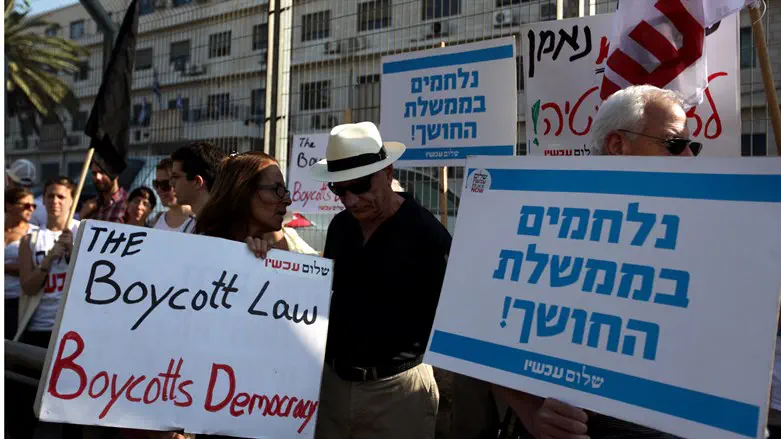
Is there any doubt that BDS (Boycott Divestment and Sanctions) is something Israel should fight? While the answer may seem obvious, apparently not everyone agrees. What lies behind the delays in finalizing the Anti-Boycott Law (ABL) and rendering the law fully functional?
The ABL was passed by the Knesset in 2011 but it is not fully operational until regulations (procedures for applying the law) are approved by the Knesset committee relevant to the law in question. According to MK Moshe Arbel, one of the committee members, the ABL-regulations have the support of the majority of members of the Knesset Law Committee and, thus, would easily be approved. Therefore one must ask if the Committee chairman’s apparent delaying in bringing the matter to discussion is even democratic.
What is the Nature of the Disagreement with the Law?
Some claim that BDS is a matter of freedom of speech. In fact that is the focus of debate in a number of states regarding America’s Israel Anti-Boycott legislation. Those opposed to the Law argue that boycotts are a form of expression of opinion and, as such, companies who boycott Israeli companies should not be muzzled by any law. Legal expert Eugene Kontorovich, however, explains that companies that want to boycott Israeli firms are free to do so even under this law with the exception that they will not be awarded government contracts or otherwise benefit from taxpayer monies.
The same argument pertains to Israel. Businesses and organizations are free to operate or desist from operating in any part of the country they desire. The law does not force companies to sell their products in Judea-Samaria or to buy products produced in Judea-Samaria if they are opposed to the presence of Jews there. Their opinion is not being criminalized.
What the law says is that companies, such as Unilever, that are boycotting the communities in Judea-Samaria will not get government contracts to operate anywhere in Israel. It says that organizations that call for boycott against Israel, such as Israel’s branch of Amnesty International, will not benefit from tax-exempt status afforded to eligible non-profit organizations. In other words, companies and organizations that promote anti-Israel actions will not benefit from taxpayer funds in any way.
Where it Stands Now
While the law passed in 2011, the regulations that form an integral part of it have not been approved. First the finance minister, then the justice minister must approve the regulations and then the document goes up for discussion in the Law Committee for final approval.
It was only in 2018 that then Finance Minister Kahlon signed the regulations but nothing happened after that. Suddenly, after the recent publication of the Amnesty Report declaring Israel an apartheid state, Finance Minister Liberman and Justice Minister Sa’ar signed the regulations.
And then something happened on the way to the Law Committee.
I tried to get responses to queries regarding the fate of the regulations. Without naming names, I was told by relevant individuals that they had not yet seen the regulations, that the regulations had not yet been delivered to the committee, that the regulations had reached the committee weeks earlier, that I should send an email to the committee, that I should ask this or that individual who sent me on to ask someone else, that there was an overloaded committee schedule that left no time for the matter, that there were sufficient committee members ready to approve the regulations and about 30 minutes at most is what would be required, that the committee had enough time to discuss “settler violence” that was actually not within their domain but not the half-hour required to approve the regulations. Need I say more?
With the Knesset recess quickly approaching, a sense of urgency took hold. Shai Glick, of the NGO B’tsalmo, who has long been spearheading the campaign to finalize the law by getting the regulations signed at last, applied more pressure behind the scenes.
On March 1, five MKs, Moshe Arbel (Shas), Zvi Hauser (New Hope), Sharren Haskel (New Hope), Shlomo Karhi (Likud), and Uri Maklev (UTJ) signed a letter addressed to Law Committee Chairman Gilad Kariv (Labor) requesting that he convene a session to discuss the regulations. Yomtov Kalfon (Yamina) posted a Tweet on 5 February asking that the committee be convened.
According to Knesset regulations, if one-third or more of the committee membership request an emergency session, the chairperson has no choice but to set it up within ten days. With 13 members plus the chairman, the requisite third requested the emergency session.
It has yet to be scheduled.
Kariv told me via his spokesman that he “shares the concern for the fight against BDS and the boycott movement”. Yet, when questioned about why he is delaying calling the committee session for approval of the regulations, he ignored me. The only explanation that makes sense to me is that Kariv believes that the law contravenes freedom of speech. In other words, he does not distinguish between speech and action. He also does not seem to appreciate that, while opinions are legal and permissible, the country being acted against does not have to financially support the bad actor that harms it.
In any case, Kariv’s personal ideological point of view is irrelevant here – he has a duty to the democratically elected representative body to follow the will of the majority. And the majority clearly wants to finalize the ABL in all its parts. The Knesset regulations instruct him to convene the session that will carry that out. His delaying tactics comprise the behavior of a dictator. (If I have misrepresented MK Kariv here, I invite him to correct me.)
Because the regulations remain in a dormant state, instead of Unilever being refused contracts to provide the IDF and government bodies with food products valued at millions of shekels per year, we have the Israeli Ben & Gerry’s franchise holder, Avi Zinger, who refuses to capitulate to the boycott, being denied a renewed contract. That will put hundreds of Israelis in direct employment in the factory as well as those providing support services (transportation companies, for example) out of jobs.
And that is only part of the problem.
B’tsalmo’s CEO, Shai Glick, argues that “the fight against boycott is the fight against discrimination and hatred toward the Jews and the citizens of Israel, and it hurts the Palestinians as well.” We saw this clearly when Soda Stream relocated from Judea-Samaria to the Negev, causing citizens of the Palestinian Authority to lose their jobs. “Approval of the ABL-regulations,” continued Glick, “will allow the government to carry out its obligations of care for the citizens of Israel and to fight all who seek to harm the nation.”
Most absurd of all is the situation in which Zinger is suing Unilever in an American court of law based on the Anti-Boycott Law in that country and has no recourse for finding a resolution to the issue within Israel. Israel is not, as Glick said, fulfilling her obligations to take care of her citizens in this arena.
Sheri Oz blogs at Israel Diaries
